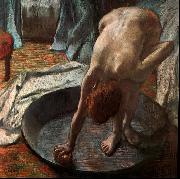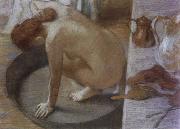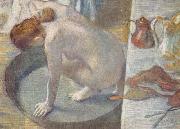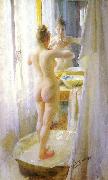Wholesale Oil Painting Reproductions No Minimum and Door to Door! |
|||||||||||
|
|
|||||||||||

|
|||||||||||
|
|
|
||||||||
All Edgar Degas Oil Paintings |
||||||||
|
|
||||||||
|
|
||||||||
|
Artist Introduction: French Realist/Impressionist Painter and Sculptor, 1834-1917
French painter, draughtsman, printmaker, sculptor, pastellist, photographer and collector. He was a founder-member of the Impressionist group and the leader within it of the Realist tendency. He organized several of the group exhibitions, but after 1886 he showed his works very rarely and largely withdrew from the Parisian art world. As he was sufficiently wealthy, he was not constricted by the need to sell his work, and even his late pieces retain a vigour and a power to shock that is lacking in the contemporary productions of his Impressionist colleagues. |
||||||||
|
|
||||||||
|
The Tub Painting ID:: 866 |
1885-86 |
|||||||
Height Width |
INS/CM Quality |
|||||||
|
X |
| |||||||
|
|
||||||||
All Edgar Degas Oil Paintings |
||||||||
|
|
||||||||
|
|
||||||||
|
Artist Introduction: French Realist/Impressionist Painter and Sculptor, 1834-1917
French painter, draughtsman, printmaker, sculptor, pastellist, photographer and collector. He was a founder-member of the Impressionist group and the leader within it of the Realist tendency. He organized several of the group exhibitions, but after 1886 he showed his works very rarely and largely withdrew from the Parisian art world. As he was sufficiently wealthy, he was not constricted by the need to sell his work, and even his late pieces retain a vigour and a power to shock that is lacking in the contemporary productions of his Impressionist colleagues. |
||||||||
|
|
||||||||
|
|
the tub Painting ID:: 56321 |
mk247
1886,pastel on card ,23.625x32.625 in,60x83 cm,musee d orsay,paris,france |
||||||
Height Width |
INS/CM Quality |
|||||||
|
X |
| |||||||
|
|
||||||||
All Edgar Degas Oil Paintings |
||||||||
|
|
||||||||
|
|
||||||||
|
Artist Introduction: French Realist/Impressionist Painter and Sculptor, 1834-1917
French painter, draughtsman, printmaker, sculptor, pastellist, photographer and collector. He was a founder-member of the Impressionist group and the leader within it of the Realist tendency. He organized several of the group exhibitions, but after 1886 he showed his works very rarely and largely withdrew from the Parisian art world. As he was sufficiently wealthy, he was not constricted by the need to sell his work, and even his late pieces retain a vigour and a power to shock that is lacking in the contemporary productions of his Impressionist colleagues. |
||||||||
|
|
||||||||
|
|
The Tub Painting ID:: 58627 |
The Tub, 1886, Mus??e d'Orsay, Paris, France
|
||||||
Height Width |
INS/CM Quality |
|||||||
|
X |
| |||||||
|
|
||||||||
All Anders Zorn Oil Paintings |
||||||||
|
|
||||||||
|
|
||||||||
|
Artist Introduction: Swedish 1860-1920
Swedish painter, etcher and sculptor. He was brought up by his grandparents at Mora. As he displayed a precocious talent for drawing he was admitted to the preparatory class of the Kungliga Akademi for de Fria Konsterna, Stockholm, at the age of 15. Dissatisfied with the outdated teaching and discipline of the Academy and encouraged by his early success as a painter of watercolour portraits and genre scenes (e.g. Old Woman from Mora, 1879; Mora, Zornmus.) Zorn left the Academy in 1881 to try to establish an international career. He later resided mainly in London but also travelled extensively in Italy, France, Spain, Algeria and the Balkans and visited Constantinople. However, he continued to spend most of his summers in Sweden. |
||||||||
|
|
||||||||
|
|
The Tub Painting ID:: 95393 |
Country of Origin: Sweden
Date of Creation: 1888
TTD
|
||||||
Height Width |
INS/CM Quality |
|||||||
|
X |
| |||||||
|
|
||||||||
|
Prev Next
|
||||||||
|
|
||||||||
|
Related Paintings to Anders Zorn :. |
||||||||
|
|
||||||||
|
CONTACT US |




